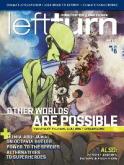Subscribe to Our Newsletter
Special Offer from PM Press
Now more than ever there is a vital need for radical ideas. In the four years since its founding - and on a mere shoestring - PM Press has risen to the formidable challenge of publishing and distributing knowledge and entertainment for the struggles ahead. With over 200 releases to date, they have published an impressive and stimulating array of literature, art, music, politics, and culture.
PM Press is offering readers of Left Turn a 10% discount on every purchase. In addition, they'll donate 10% of each purchase back to Left Turn to support the crucial voices of independent journalism. Simply enter the coupon code: Left Turn when shopping online or mention it when ordering by phone or email.
Click here for their online catalog.
Other Worlds are Possible: Visionary Fiction, Culture and Organizing
 I think I would have always believed in revolutionary change, and believed in the power of people to organize for that change. But without visionary fiction, I don’t think I would have had the imagination or the permission to actually see and touch and feel what that new world could look like. How will we live? What will we eat? How will we interact with each other? What will gender and racial and class relationships look like? How will children be raised? How will we deal with aggression and violence and war?
I think I would have always believed in revolutionary change, and believed in the power of people to organize for that change. But without visionary fiction, I don’t think I would have had the imagination or the permission to actually see and touch and feel what that new world could look like. How will we live? What will we eat? How will we interact with each other? What will gender and racial and class relationships look like? How will children be raised? How will we deal with aggression and violence and war?
This special section of Left Turn Magazine creates a space where we can explore the possible impact of visionary fiction on our movements for social change. We came up with the term “visionary fiction” as a way to speak directly to those transformative qualities present in science fiction, speculative fiction, fantasy, superheroes and comic books, alternate history, and magical realism. Sci-fi geeks are known to be fairly hardcore on their definitions, and friendships have ended over a disagreement about what is considered real science fiction and what is not. Rather than get caught up in a Tholian web of words, we want to be able to explore a literature that not only allows us to analyze, understand and critique the world we live in, but to imagine and re-imagine a world of the future.
And when you think about it, all of the organizing work we do everyday is based on a science fiction premise: If there were no more prisons, no more hunger, no more police brutality, no more sexual violence, no more oppression, what would our world look like? And what would each of us look like?
Included in this section is a series of short pieces by organizers reflecting on specific visionary fiction books, authors and films which highlight the importance of this re-envisioning, not just for tomorrow, but for today’s activists. As filmmaker Cauleen Smith told writer Alexis Pauline Gumbs when asked why she chose to make a science fiction film about New Orleans instead of a documentary, “A documentary… seemed to me to be the best way to lie.” These authors are uncovering the truths wrapped in the fantastical.
Mumia Abu-Jamal wrote in his article Sci-Fi and Black Folks, “One sees in much Black sci-fi the core of what we find in good fiction: relationships between people—or at least beings.” Talk about black liberation and it perhaps hits a little too close to home; but frame it as mutants or alien races, and you allow both people of color and white folks a little space to reflect, to slip into the other’s shoes. Visionary fiction allows us to step out of our skins and out of this galaxy, into alien bodies under strange stars, to explore those entirely human themes we write and agitate and organize around every day.
Walidah Imarisha is a poet, activist, educator, and independent journalist. She is the bad half of the poetry duo Good Sista/Bad Sista. Walidah currently teaches part time at Portland State University in the Black Studies Department and engages in prisoner support organizing. Her website: Walidah.

